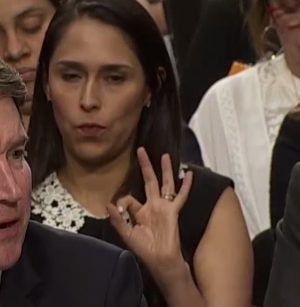Thomas Jipping
-
 Non-Sequiturs
Non-SequitursNon Sequiturs: 03.17.19
* With Justice Anthony M. Kennedy off the Supreme Court, who has replaced him as the justice most often in the majority? The answer might surprise you (but note that this is based on only part of the Term). [Empirical SCOTUS]
* Speaking of SCOTUS, what does its recent copyright ruling in Fourth Estate v. Wall-Street.com mean for creators? Here’s a clear and concise breakdown. [All Rights Reserved]
* In the wake of the giant college admissions scandal, is it time to rethink how elite institutions admit their students? David Orentlicher offers this proposal for reform. [PrawfsBlawg]
* Joel Cohen suggests that perhaps Ty Cobb should have kept his praise of Robert Mueller to himself. [The Hill]
* What’s the state of U.S. Philippines relations, including the 1951 Mutual Defense Treaty, in light of expanding Chinese influence in southeast Asia? It’s complicated, according to Mark Nevitt. [Just Security]
* How has the judicial confirmation process changed under President Donald Trump? Pretty significantly, as Thomas Jipping explains. [Bench Memos / National Review]
* Congratulations to the latest winner of the Joseph Story Award, Professor Samuel Bray — who delivered an acceptance speech that’s well worth your time. [Volokh Conspiracy / Reason]
* Is a federal law that prohibits federal agencies from using equipment from the controversial Chinese company Huawei an unconstitutional Bill of Attainder? Easha Anand, Charlie Gerstein, and Jason Harrow tackle this question, and more, in the latest episode of Versus Trump. [Versus Trump via Take Care]
-
 Non-Sequiturs
Non-SequitursNon Sequiturs: 03.03.19
* Several weeks after its release, Over My Dead Body, Wondery’s new podcast exploring the Dan Markel case, continues to top the podcast charts — and creators Matthew Shaer and Eric Benson have some thoughts on why the case has seized the public imagination. [Inside Edition]
* The Keith Tharpe case, far from representing an isolated injustice, reflects and embodies the racist roots of the death penalty in America, according to Stephen Cooper. [CounterPunch]
* The fight against racism in the justice system has been going on (and will continue) for many years — and as Texas lawyer John Browning has discovered, trailblazing African American attorneys were fighting to integrate the bar of the Lone Star State as early as the 1800s. [Texas Lawyer]
* I’ve previously argued against treating blue slips as senatorial vetoes of judicial nominees, based on their consequences for the federal judiciary — and as Thomas Jipping points out, history supports treating blue slips as a senatorial courtesy, nothing more. [Bench Memos / National Review]
* Don’t be fooled by the high level of unanimity in the Supreme Court’s first few decisions of the Term; greater disagreement lurks in the “shadow docket,” as Adam Feldman explains. [Empirical SCOTUS]
* The compromise appropriations bill that saved us from another government shutdown could also advance the Trump Administration’s “remain in Mexico” policy for asylum seekers from Central America — which Stewart Baker believes “may offer a better solution to the immigration crisis than the construction of a few miles of new wall.” [Lawfare via Volokh Conspiracy / Reason]
* Actor James Woods is out of the woods in a defamation lawsuit arising out of an erroneous tweet of his, thanks to this interesting ruling by the Sixth Circuit. [How Appealing]
* Jean O’Grady is excited about Panoramic, the latest offering from Thomson Reuters, which transforms “the ambitious idea of merging workflow and billing into an actual product.” [Dewey B Strategic]
 Sponsored
SponsoredHow Transactional Lawyers Can Better Serve (And Maintain) Their Clients
Sign up and join us for our CLE webinar. From importing your checklist to delivering the closing book, you can bolster client service throughout the…-
 Non-Sequiturs
Non-SequitursNon Sequiturs: 02.10.19
* Irina Manta, a recent addition to the roster of Volokh Conspirators, assesses some of the attacks leveled against D.C. Circuit nominee Neomi Rao. [Volokh Conspiracy / Reason]
* In other nomination news, Thomas Jipping explains why conservatives should temper their excitement over those 44 judicial nominees who just got reported out of the Senate Judiciary Committee. [Bench Memos / National Review]
* Michael Dorf’s take on Chief Justice John Roberts joining the four liberals on the Supreme Court to put the Louisiana abortion law on hold: the right to an abortion is “not in quite as much immediate danger as one might have thought. And that’s not nothing.” [Take Care]
* Lawyer to the stars Alex Spiro, partner at Quinn Emanuel, talks about how he’s approaching the representation of his latest celebrity client, rapper 21 Savage. [Complex]
* On the occasion of his 15th blogiversary (congratulations!), Rick Garnett reflects on the past and future of blogging. [Mirror of Justice via PrawfsBlawg]
* Jean O’Grady chats with Pablo Arredondo of Casetext about the platform’s newest features. [Dewey B Strategic]
* And in other legal technology news, congrats to legal AI innovator Luminance on securing another $10 million in funding (reflecting a total valuation for the company of $100 million). [Artificial Lawyer]
* Last Thursday, Alabama executed Domineque Hakim Marcelle Ray and did not allow his imam to be present (even though Christian inmates can have the prison chaplain present) — a manifest injustice, according to Stephen Cooper. [Alabama Political Reporter]
* In the latest installment of his ongoing series offering advice to trial lawyers, David Berg sets forth an essential rule of cross-examination. [YouTube]
-
 Non-Sequiturs
Non-SequitursNon-Sequiturs: 09.09.18
* Here’s the truth behind what some saw as Zina Bash making a “white power” sign at the confirmation hearings of her former boss, Judge Brett Kavanaugh. [Washington Post]
* With the Kavanaugh confirmation hearings in the rearview mirror, now is a good time to look back at the last four Supreme Court confirmation hearings. [Empirical SCOTUS]
* Thomas Jipping summarizes research showing that the American Bar Association does tilt leftward in rating judicial nominees — which is why its unanimous “well qualified” rating for Judge Brett Kavanaugh is especially impressive. [Bench Memos / National Review]
* Jonathan Adler argues that claims of a Justice Kavanaugh threatening the Affordable Care Act aka Obamacare have been greatly exaggerated. [Volokh Conspiracy / Reason]
* But a Justice Kavanaugh likely would affect the Supreme Court’s jurisprudence on presidential authority and the separation of powers. [Instapundit]
* Speaking of the Supreme Court, conservative (and tiny) Hillsdale College punches above its weight in producing SCOTUS clerks — so Paul Rahe wants to know, why can’t his school get any love from the
U.S. NewsWall Street Journal rankings? [Ricochet]* President Donald Trump’s “radically direct” tweets about pending prosecutions threaten the rule of law, according to Gerald Lefcourt and Joel Cohen. [Law & Crime]
* Legal research smackdown: Lexis v. Casetext! [Dewey B Strategic]
* And in other notable news from the world of legal tech, iManage just acquired business-process company Elegrity, which works in the risk and compliance management space. [Artificial Lawyer]